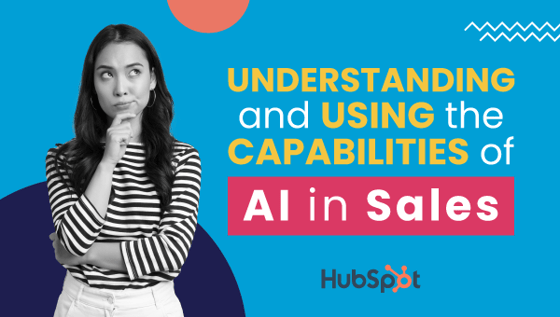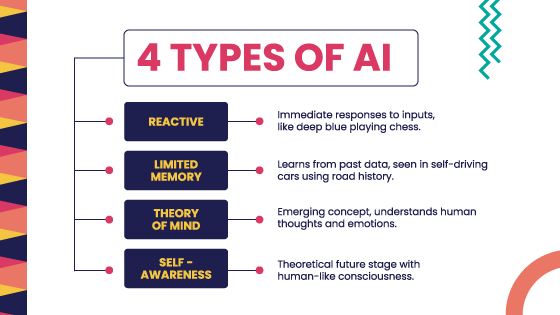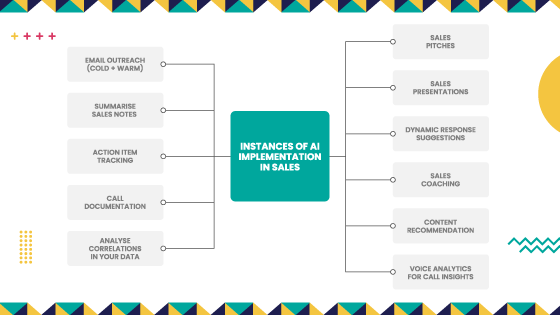


Understanding and Using the Capabilities of AI in Sales




Artificial intelligence (AI) stands tall as a revolutionary force in the technological landscape, transforming the way we interact with technology and how businesses operate.
By emulating human intelligence, AI has become a cornerstone of innovation, impacting various sectors from healthcare to finance, and marketing to customer service. As we delve into the realm of AI, we discover a fascinating synergy between vast data sets and intelligent algorithms that allows for new possibilities.
In this article, we will explore the essence of AI, the changing landscape of sales, and the ways AI can enhance and revolutionise Sales enablement processes. If you’re ready to learn how AI's capabilities can augment sales efforts, boost efficiency, and pave the way for new opportunities, continue reading to ultimately reshape the way you approach sales.
What is Artificial Intelligence (AI)?
Artificial Intelligence (AI) is not a singular entity but a collective term for computer systems that excel at tasks demanding human-like cognitive abilities. These tasks encompass visual perception, speech recognition, language translation, decision-making, and problem-solving. Through continuous advancements, AI has transcended its earlier limitations and now thrives as an indispensable tool in transforming mundane processes into efficient, data-driven experiences.
The fundamental premise of AI's functionality lies in its capacity to learn from patterns and features present in the data it analyses. By feeding vast amounts of data to these AI algorithms, they can continuously process, adapt, and evolve. With each round of data processing, the AI system scrutinises its own performance, fine-tuning its abilities to attain a deeper level of expertise.
At the heart of AI's power is its ability to tackle repetitive tasks with astounding efficiency. Thanks to its computational power, AI can effortlessly handle thousands, even millions, of tasks in quick succession. This iterative process of learning and improvement propels AI to refine its performance in a remarkably short span.
Four Types of AI
Not all AI systems are created equal. There are various types of AI, each distinct in its capabilities and limitations. Understanding these different categories empowers businesses to leverage AI to its full potential, aligning it with specific use cases to yield optimal results. The four types of artificial intelligence are:
- Reactive
- Limited memory
- Theory of mind
- Self-awareness

What is Reactive AI?
The first type is reactive AI, which exclusively responds to its surroundings without the ability to retain past experiences for real-time decision-making or problem-solving. Despite this limitation, reactive AI offers reliability and consistency in its responses. One example is Deep Blue, the supercomputer that outperformed chess champion Garry Kasparov by applying the game's rules to identify and move chess pieces without anticipating its opponent's moves.
What is Limited Memory AI?
The second category, limited memory AI, possesses the capability to store and use past data and predictions to enhance decision-making. Machine learning models under this type are continuously trained with new data, following a six-step process: creating training data, building the model, enabling predictions, receiving feedback, storing the feedback as data, and repeating the cycle. Self-driving cars are an excellent example of limited memory AI, utilising previous data on roads, maps, traffic signals, and more to make informed driving decisions.
What is Theory of Mind AI?
Next, theory of mind AI remains in the conceptual stage, characterised by the potential to understand and interact with humans' thoughts and emotions. This type of AI aims to comprehend the needs, beliefs, feelings, and thought processes of the entities it engages with. Although theory of mind AI is still in the realm of innovation, one example of a future possibility is autonomous cars analysing and understanding their drivers' mental and emotional states to enhance safety.
What is Self-Awareness AI?
The final type of AI is self-awareness, which would entail machines possessing not only an understanding of human emotions and mental states but also an awareness of their own existence within the world. Once theory of mind AI becomes a reality, self-aware AI might emerge with human-like consciousness, marking a significant leap in the capabilities and implications of artificial intelligence.
As businesses embrace AI to optimise their operations, it is essential to weigh its capabilities against specific requirements. There is no doubt that the power of AI is undeniably reshaping our world, disrupting traditional approaches, and setting new standards for technological advancement.
By utilising AI and understanding its different types, businesses can make informed decisions, gaining a competitive edge in today's AI-driven landscape.
The Changing Landscape of Sales
The landscape of sales has undergone a profound transformation in recent years, driven by technological advancements and changing market dynamics. The emergence of the COVID-19 pandemic further accelerated these changes, pushing businesses to adapt to remote selling and virtual interactions. Sales teams are now no longer confined to physical offices but are scattered across various geographies, leveraging digital tools to forge connections and close deals.
The once "traditional" sales approach has witnessed a significant shift as businesses embrace technology to augment their sales strategies. Customers now expect personalised experiences, and sales professionals must cater to these evolving demands. In this dynamic environment, AI has emerged as a game-changer, revolutionising the way sales teams operate and interact with prospects and clients.
How can AI revolutionise sales?
Here, we will discuss these three key benefits of AI:
- Saving time and mental energy
- Improved asset management and forecasting
- New creativity through experimentation

Better Time Management
One of AI’s key benefits is the time it saves. Time is a valuable asset for sales professionals, and AI plays a crucial role in optimizing their schedules. By automating manual and tedious tasks, AI empowers sales reps to focus on high-value activities, such as building relationships and closing deals.
Time-consuming activities like note-taking, action item tracking, and call documentation are streamlined with AI-powered automation tools, liberating sales teams to concentrate on what truly matters: engaging with prospects and providing exceptional customer experiences.
Better Asset Management and Forecasting
Sales involves managing many prospects and vast amounts of customer data, which can be overwhelming without the right tools. AI-driven systems assist sales teams in organising important reports and customer records, providing a comprehensive view of each interaction and relationship. Moreover, AI can analyse this data to draw correlations between various factors, such as company size, industry, and geography, helping with forecasting and strategic planning.
With AI's data-driven insights, sales professionals can make well-informed decisions, tailor their approach to different customer segments, and anticipate their needs proactively.
Experiment and Unlock Creativity
Sales can experiment with AI to produce more creative, compelling pitches. Innovation and experimentation are vital for staying ahead in a competitive market. However, trying new sales tactics can be daunting, especially without a clear understanding of their potential impact. AI comes to the rescue by streamlining the process of crafting outbound outreach, emails, promotional materials, and social content. AI simplifies and expedites these various writing processes. Whether you need to refine the messaging to be more engaging, persuasive, or personalised, AI can aid in generating compelling content to effectively reach your target audience.
With AI-powered language capabilities, the process of generating written content becomes more efficient and user-friendly. Instead of spending significant time brainstorming ideas and struggling with the right words, you can leverage AI to quickly generate drafts or alternative versions of your content. This streamlining of the writing process allows you to focus on other critical aspects of your business or marketing strategy.
Moreover, exploring new approaches and experimenting with different communication styles can indeed be daunting. However, AI can be a valuable ally in this journey of trying something new. By using AI-generated content as a starting point, you can gain fresh perspectives and innovative ideas to refine your outreach strategies. By providing valuable suggestions and automating repetitive tasks, AI encourages sales reps to explore new ideas, fostering a culture of creativity and adaptability within the sales team.
As businesses continue to embrace AI in sales, the combination of human expertise and technological prowess will prove to be a potent force, driving revenue growth and customer satisfaction like never before. Embrace the AI-powered sales revolution, and embark on a journey of boundless possibilities in the world of modern commerce.
Parting Advice
As we look ahead to the AI-powered future of sales, it's essential to remember that AI is not intended to replace salespeople; instead, it is a powerful tool to enhance their capabilities and drive success. With the right AI tools at their disposal, sales professionals can exceed expectations.
Embracing AI as a strategic ally empowers sales teams to optimise their time, focus on building meaningful relationships, and provide personalised experiences to customers. By automating repetitive tasks, AI frees up valuable time, enabling sales reps to concentrate on high-impact activities that foster growth and revenue.
Furthermore, AI's ability to organise vast amounts of data and draw valuable insights allows sales professionals to make informed decisions and forecast with greater accuracy. Leveraging AI to experiment and unleash creativity fosters a culture of innovation and adaptability within the sales team, driving continuous improvement and success.
In this AI-driven landscape, the key lies in striking the perfect balance between technology and human expertise. Incorporate AI into your work, revel in its benefits and see how it is a total game changer for modern sales professionals, and watch as AI-powered tools propel your sales endeavours towards unparalleled heights of achievement.
Author: Autumn Witter is a Marketing and SEO Strategist at HubSpot. She is a graduate of the illustrious Howard University. When she's not talking about SEO, you can find her in the recording studio making R&B hits or traveling.








